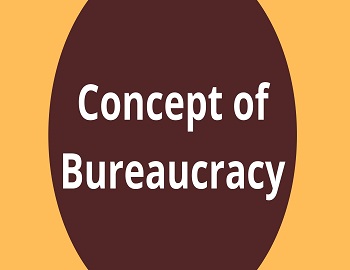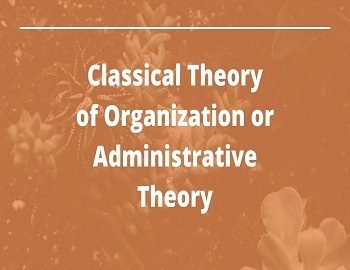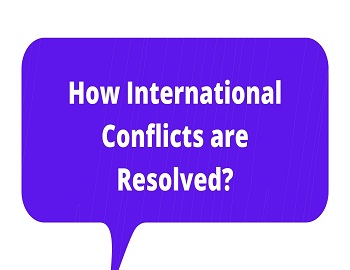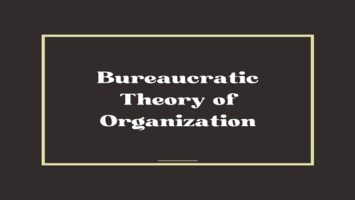Table of Contents
Concept of Bureaucracy:
Bureaucracy constitutes the permanent and professional dimension of the executive. It is usually described as the non-political or politically neutral, permanent, professionally trained executive which runs the administration of the state according to the policies laid down and under the control exercised by the political executive. Upon its qualities and efficiency depend the quality and efficiency and success of the state administration. The policies of the government are formulated with the help of the information and expertise provided by the bureaucracy and they are in practice implemented and realized with its help. In every type of political system, whether of capitalist societies or communist societies, bureaucracy exercises a large amount of power. It is widely believed, as Weber also suggested, that “the power of the bureaucracy could not be checked by political authorities, either in a democratic system or in a communist society”. Marxian logic that bureaucracy thrives only in a capitalist society is indeed partial. Bureaucracy thrives in all societies and exercises a large amount of power.
The modern positive welfare state has made it essential for every government to organize, maintain and use the services of a qualified, trained and expert bureaucracy for securing the social, economic, cultural and developmental goals of the society. The study of bureaucracy, its functions and role, therefore, forms an important subject of study. Much attention has been paid to this aspect ever since Max Weber developed the content of the concept of bureaucracy. In public Administration studies, Weber’s analysis of bureaucracy has played a heuristic role in so far as it has greatly encouraged the scholars to analyze and compare the role of bureaucracies in different countries of the world.
Bureaucracy Meaning:
Traditionally, Bureaucracy stands defined as that form of government in which the state power is exercised or a large amount of state power is exercised, by the state officials- the permanent civil services. As H. J. Laski observes “Bureaucracy is the term usually applied to a system of government the control of which is so completely in the hands of officials and their power jeopardizes the liberties of ordinary citizens. The characteristics of such a regime are a passion for routine administration, the sacrifice of flexibility to rule, delay in making decisions and a refusal to embark upon experiment”. Encyclopaedia Britannica also defines Bureaucracy in a traditional and negative form as “the concentration of administrative power in bureaus or departments, and undue interference by officials in matters outside the scope of state interference”. However, nowadays, Bureaucracy is taken to mean “a group of persons which man the government departments and perform definite functions which the community at large considers worthwhile”. The terms civil service, government servants, magistracy, officials of government, officials, permanent executive, and non-political executive are used to describe the class of such persons. The term “Bureaucracy” and “civil service” are used as synonyms and they refer to all the civil servants who carry out all the work associated with the running of the administration of the government.
Narrow and Broad Uses of the term Bureaucracy:
The term ‘Bureaucracy’ is used in a narrow sense to denote the important public servants who occupy higher-level positions in the administrative hierarchy and perform policy-making, coordination, supervising and controlling functions in the system of administration. In the broad sense, it refers to all the permanent employees of the government right from the peons and clerks to the top-level officers, secretaries and chief secretary.
In the narrow sense, we can, as S. R. Maheshwary writes, define bureaucracy as “the public personnel engaged in policy and supervisory responsibilities in public administration”. In the broad sense, we can define bureaucracy as “the sum-total of public officials who work as permanent paid employees on the payroll of the government”.
Bureaucracy Definition:
(1) J. W. Garner writes, “Bureaucracy means the civil servants- the administrative functionaries who are professionally trained for the public service and who enjoy permanency of tenure, promotion within service- partly by seniority and partly by merit”.
(2) Willoughby offers two definitions- one in the larger sense and the other in the restricted sense. In the larger sense, the term Bureaucracy is used to describe “any personnel system where the employees are classified in a system of administration composed of a hierarchy of sections, divisions, bureaus, departments and the like”. In the restricted sense, it denotes the body of public servants organized in a hierarchical system that stands outside the sphere of effective public control.
(3) In the words of Max Weber, “It is a system of administration characterized by expertness, impartiality and absence of humanity”.
(4) Appleby defines Bureaucracy as “a professional class of technically skilled persons who are organized in a hierarchical way and serve the state in an impartial manner”.
(5) Finer prefers to use the term Civil Service in place of Bureaucracy and defines it as “a professional body of officials permanent, paid and skilled”.
(6) According to Gladden, Bureaucracy means “a regulated administrative system organized as a series of inter-related offices”.
(7) Friederich conceptualized Bureaucracy in terms of its six primary features. These are differentiation of functions, qualifications for office, hierarchical organization, discipline in the objectivity of method, precision and consistency or continuity involving adherence to rules, red tape and keeping of records, and lastly, the exercise of discretion, involving secrecy in regard to certain aspects of government.









Comments (No)